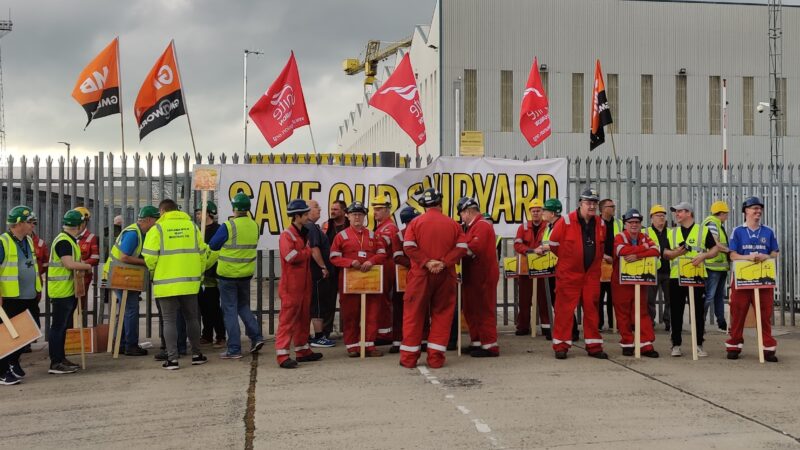The lessons for workers are clear. Join a trade union, show solidarity with fellow workers and vote for a political party that will enhance market and political power of labour.

Prem Sikka is an Emeritus Professor of Accounting at the University of Essex and the University of Sheffield, a Labour member of the House of Lords, and Contributing Editor at Left Foot Forward.
The UK inflation rate, as measured by the retail price index, is expected to hit 17.7% by the end of the year. The Bank of England expects the UK economy to plunge into recession later this year. The main reason is that workers’ wages are failing to keep pace with inflation and people inevitably reduce discretionary expenditure.
Why are real wages falling? In classical economic theory, wages are the outcome of supply and demand for labour. But there is no glut of workers. With nearly 1.3 million unfilled vacancies, employers should be offering higher wages to recruit and retain workers, but that is not the case. There is acute shortage of doctors, nurses, teachers, workers in care homes, tourism, hospitality and agriculture, but employers are not offering inflation-busting pay rises.
A more plausible explanation is that wages are the outcome of the power of labour. When that power is strong, workers are able to maintain and even enhance their share of gross domestic product (GDP). When that power is weak, they struggle to maintain their share.
In neoliberal economies, workers bring two forms of interlinked powers to bear on wage negotiations and bargaining. These are “market power” and “political power”. Market power is associated with workers’ collective rights. Trade unions can bring pressures upon employers through co-operation and conflict to increase their members’ share of a company’s income. Workers can take industrial action to increase labour’s share of GDP.
Workers’ ability to wield market power is dependent upon wider politics or “political power”. In general, a tilt to the left can enable workers to claim a higher share of the firm’s income, employment and welfare rights. Similarly, a tilt to the right reduces possibilities of higher wages and an improved share of income.
In the 1970s, trade unions had around 13 million members or 55.4% of all workers. Unsurprisingly, in 1975, workers share of GDP, in the form of wages and salaries was 65.1%. Since 1979, the Conservative government engaged, sometimes violently, with trade unions and abolished the ‘closed shop’, made prior balloting compulsory for all strike actions, banned secondary picketing and under certain circumstances trade unions could be sued for damages caused by industrial action. There were no equivalent restrictions on mobility and accountability of capital.
The 1997-2010 Labour administration did not reverse any of the Conservative trade union laws though it introduced the national minimum wage.
By 2021, trade union membership levels among UK employees fell to 6.44 million or 23.1% of the labour force. Workers’ share of GDP was barely 50% by the end of March 2022.
The state has facilitated assaults on wages and employment rights. Zero-hour contracts, firing workers and rehiring them on inferior pay and conditions has become widespread.
The UK has tilted to the right and the Conservative government has nakedly prioritised the interests of capital over Labour. This is typified by the actions of P&O Ferries which in March 2022 sacked 800 employees without any warning and replaced them with cheaper agency staff. Its chief executive said that the company knowingly violated employment law. The Prime Minister said that P&O violated employment law, but there was no prosecution. Instead, the government enacted the Conduct of Employment Agencies and Employment Businesses (Amendment) Regulations 2022 which permit employers to replace striking workers with cheaper agency workers. The government intends to further weaken the bargaining power of workers by banning strikes in essential services and forcing striking workers to provide minimal levels of service during an industrial dispute.
At the same time, the Labour Party, a traditional ally of workers, is further distancing itself from trade unions and that prompted the leader of Unite, the UK’s second largest trade union, to ask “which side are you on?” Last month, Labour leader sacked the shadow transport minister because he joined striking railway workers on the picket line to support their demand for higher wages.
Since the Second World War, workers have maintained or increased their share of GDP by exercising market and political power. Both have been weakened since the late 1970s, culminating in wage cuts and increase in poverty. Workers on some sectors, such as the railways, are fighting back but many others have low trade union membership density and are unlikely to be able to maintain their living standards.
Historically, when the mode of production denied workers access to material goods and services, they secured it through politics. Thus, welfare rights relating to healthcare and education were secured. Such rights are now being lost as workers’ market and political power is eroded – for example, the loss of the right to free university tuition.
Sluggish economic growth and recessions are the direct consequences of low wages. People are facing the biggest fall in living standards since records began in 1956. Yet, no political party is willing to address the source of the crisis – namely the erosion of worker’s market and political power.
The lessons for workers are clear. Join a trade union, show solidarity with fellow workers and vote for a political party that will enhance market and political power of labour.
To reach hundreds of thousands of new readers we need to grow our donor base substantially.
That's why in 2024, we are seeking to generate 150 additional regular donors to support Left Foot Forward's work.
We still need another 117 people to donate to hit the target. You can help. Donate today.



